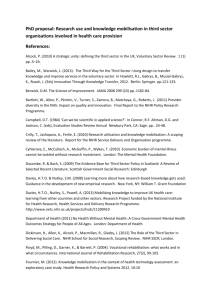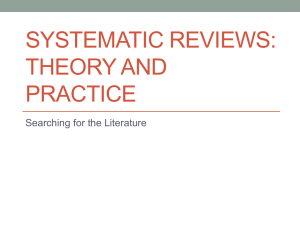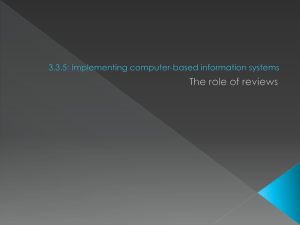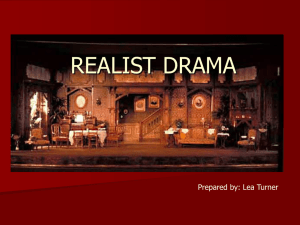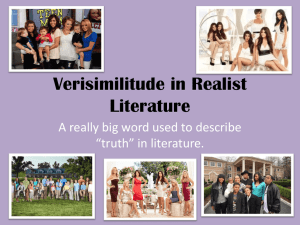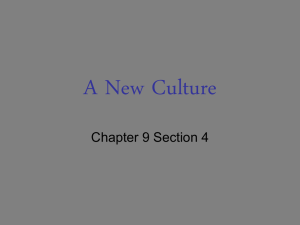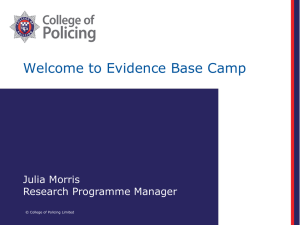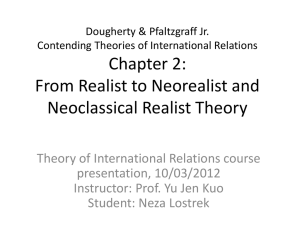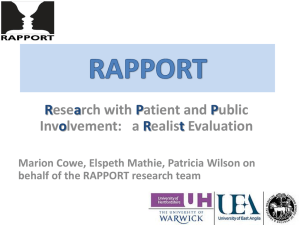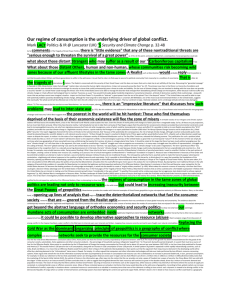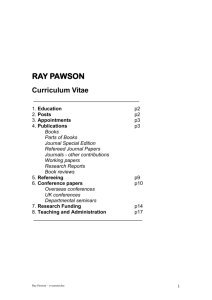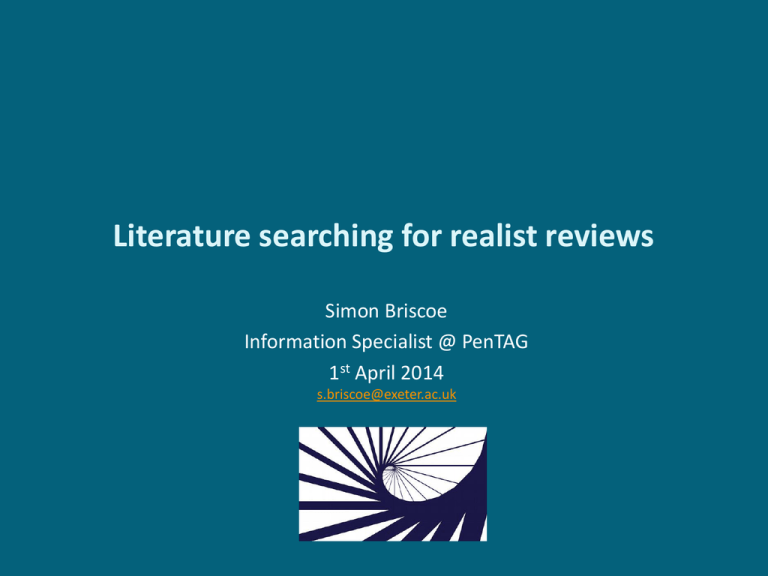
Literature searching for realist reviews
Simon Briscoe
Information Specialist @ PenTAG
1st April 2014
s.briscoe@exeter.ac.uk
Overview of presentation
1) How realist reviews are different from “traditional”
systematic reviews (slides 3-7)
2) The traditional approach to literature searching (slides 8-9)
3) The realist approach to literature searching (slides 10-12)
4) Comparison of two approaches (slides 13-14)
5) Case study: Engager II realist review (slides 15-24)
2
1. How realist reviews are different from traditional
systematic reviews
Simple intervention
A
B
Intervention
Wong, Greenhalgh and Pawson (2009?) What is a realist review and what can it do for
me: An introduction to realist synthesis
3
1. How realist reviews are different from traditional
systematic reviews
Complex intervention
F
A
B
H
C
G
J
D
I
E
K
Intervention
Wong, Greenhalgh and Pawson (2009?) What is a realist review and what can it do for me:
An introduction to realist synthesis
4
1. How realist reviews are different from traditional
systematic reviews
Why do interventions work?
Middle range theories:
• A theory that lies “…between the minor but necessary working
hypotheses that evolve in abundance during day-to-day research and the
all-inclusive systematic efforts to develop a unified theory that will explain
all the observed uniformities of social behaviour…”
• “Middle-range theory involves abstraction, of course, but they are close
enough to observed data to be incorporated in propositions that permit
empirical testing.”
Robert Merton (1967) On Theoretical Sociology
5
1. How realist reviews are different from traditional
systematic reviews
Example of middle range theory (1): School league tables
• “….measure the performance of schools in public examinations (GCSE and
‘A’ level) at the minimum school leaving age and at the end of postcompulsory secondary education.”
• “The programme theory [i.e. middle range theory] is…naming and
shaming. Simply by virtue of publishing comparative information it is
assumed that schools will compete, thereby driving up standards.”
Ray Pawson in Leuuw and Vassan (eds.) (2008) Mind the Gap: Evaluation and the Disciplines
6
1. How realist reviews are different from traditional
systematic reviews
Example of middle range theory (2): Reoffending and homelessness
• “Homelessness and re-offending have a complex link where, for many
individuals, each is both a cause and a result of the other. Among people
who are homeless there is a vast over-representation of offending
backgrounds...One in five clients using homelessness services has links
with the probation service”
From Better Together: Preventing Reoffending and Homelessness
• “If care making up the intervention for the individual is based around a
choice of what the individual wants then individuals’ are motivated and
engaged in their care”
• Middle range theory = “Offender motivation”.
7
2. The traditional approach to literature searching
1)
Scoping/background searches:
- Identify SRs and key papers;
- Start to identify search terms.
2)
Develop and execute search strategy to find evidence:
- Structure search terms using PICO(S) format;
- Test search terms using iterative process in database to ensure
appropriate balance of sensitivity and specificity;
- Run searches in various bibliographic databases.
3)
Supplementary searches?
- Forward/backwards citation chasing;
- Author citation chasing.
8
2. The traditional approach to literature searching
Key points [significant in contrast to realist review searching]
• The scope of the review and the literature search is determined at the
outset.
• An iterative process is used to develop the search strategy but only the
finalised search strategy is used to search for studies.
• The iterative process aims to ensure no relevant studies are missed in the
search.
• Using a single search strategy reflects a well-defined question and ensures
transparency and reproducibility of searching.
• The IS input is weighted towards the beginning of the review process,
where the searches are developed and run.
9
3. The realist approach to searching: Ray Pawson &
“purposive sampling”
1)
Background searches
“[E]nable the reviewer to make an initial judgement on whether the right
volume of materials of the right substance is out there to answer the questions
the review is likely to pose”
2)
Search to track programme theories
“[F]ocuses on locating the sources of administrative thinking, policy history,
legislative background and key points of contention that lie behind the
intervention….”
3)
Search for empirical evidence
“The purpose of such a search is to find primary studies that will help interrogate
the explanatory model about how the programme will work”
“The material sought here…is much more like the orthodox empirical evaluations
that are the bread and butter of standard reviews”
4)
Fine-tuning search
“Once the synthesis is almost complete the reviewer seeks out additional studies
to test those further and revised programme theories that often emerge in the
course of the review”.
Ray Pawson (2006) Evidence Based Policy: A Realist Perspective.
10
3. The realist approach to searching: Ray Pawson &
“purposive sampling”
Key points:
• “[E]ach of the searches, and all of the samples uncovered, are defined in
terms of the use to which they are put. As such they might be thought of
as relatively pragmatic and unpremeditated tasks.”
• Fine-tuning: the parameters of a review can change & an additional search
might be required, e.g. for a population group or an intervention that only
emerged in the course of the review process…
• …subsequently, IS input may be required throughout the process of the
review.
• “…cease [searching] when sufficient evidence has been assembled to
satisfy the theoretical need or to answer the question.”
Quotes from Ray Pawson (2006) Evidence Based Policy: A Realist Perspective.
11
3. The realist approach to searching: Ray Pawson &
“purposive sampling”
RAMESES Statement (publication guidelines for realist reviews):
“Where searching in electronic databases has taken place, the…[final
report]…should include, for example, name of database, search terms, dates
of coverage and date last searched. If individuals familiar with the relevant
literature and/or topic area were contacted, indicate how they were
identified and selected.”
Wong et al. (2013) RAMESES publication standards: realist syntheses.
?
12
4. Comparison of two approaches
Similarities:
1) Scoping/search for empirical evidence similar.
2) Realist reviews may be more different for reviewers than information specialists?
3) Most searches are at least developed using an iterative process.
13
4. Comparison of two approaches
Differences:
1) Searches will be designed with middle range theories in mind, although
they probably won’t search specifically for middle range theories, e.g.
they may search for a broad range of population groups.
2) Realist reviews will typically take a pragmatic and developmental
approach to literature searching (compared to systematic reviews which
aim to find everything required at the outset).
3) Searches will aim to retrieve enough information to answer a question
rather than all relevant evidence.
14
5. Case study
Developing a collaborative care intervention for prisoners with common
mental health problems, near to and after release (Engager II): a realist
review
Study Objective: “The aim is to develop and evaluate a complex clinical and
organisational intervention for prisoners with mental health problems who
are near to release…”
Review protocol
15
5. Case study
Division of labour:
1)
Background searches
Mark Pearson/Sarah Brand
2)
Search to track programme theories
Mark Pearson/Sarah Brand
3)
Search for empirical evidence
Simon Briscoe
4)
Fine-tuning
Mark Pearson/Sarah Brand/Simon Briscoe
16
17
5. Case study
PICO(S) population; intervention; comparator; outcome; (study
type).
P prisoners OR common mental health problems OR other vulnerable group
I (collaborative OR shared OR integrated OR continuity) AND (care OR healthcare
OR services OR provision OR practice)
C n/a
O The theoretical pathways from prison to community for prisoners with common
mental health problems
S No study limit (BUT reviewers will look for high level evidence in Endnote)
18
5. Case study
Search for empirical evidence:
Full list of populations
• Prisoners
• (Any persons with) common mental health problems
• Substance abusers
• Homeless persons
• Asylum seekers
• Travellers
• Sex workers
• Sex crime victims
• Self-harmers
• Learning disabilities
• Domestic abuse victims
19
5. Case study
Database: MEDLINE
Host: Ovid
Data Parameters: 1946 to October Week 5 2013
Date Searched: 13/11/2013
Searcher: SB
Hits: 1092
Strategy:
1.
2.
3.
4.
5.
6.
7.
8.
9.
10.
((alcohol* and (misus* or abuse* or "problem use*" or "problem drink*" or "illicit use*" or addict* or
dependen* or dependant or delinquency)) or (alcoholic$1 or alcoholism)).tw.
exp Alcohol-Related Disorders/
Alcoholics/
((drug* or substance) and (illegal or misus* or abuse* or "problem use*" or "illicit use*" or addict* or
dependen* or dependant or delinquency)).tw.
exp Substance-Related Disorders/
Drug users/
or/1-6
((share? or sharing or integrat* or collabora* or continuity) adj3 (care or healthcare or service? or provision? or
practice?)).tw.
7 and 8
limit 9 to english language
20
5. Case study
Selecting databases:
• Databases for each group selected according to where evidence most
likely to be found. (“Purposive sampling”).
• Reviewer screens sample to test relevance of database.
21
5. Case study
Number of hits retrieved:
Common mental health problems:
Substance abuse:
Other vulnerable groups:
Prisoners:
Total to screen:
1941
1675
1710
805
6131
(Not all screened)
22
5. Case study
“Cluster” searching (citation chasing on key papers):
• “From a single “key pearl citation”…[conduct] a series of related searches
to find contextually or theoretically proximate documents.”
Andrew Booth (2013) Towards a methodology for cluster searching to provide
conceptual and contextual “richness” for systematic reviews of complex interventions
23
5. Case study
Work in progress…
24
6. Summary
• The process of completing a realist review is less rigidly defined than for a
“traditional” systematic review.
• The search process may need to be pragmatic and developmental, with
the parameters of the search/searches changing as the review
progresses…
• …although you might find that the original searches cover most of what is
required (Engager II?)
• Searches should be recorded and reproducible (RAMESES statement)…
• …and the theory of realist reviewing suggests this should be difficult,
although in practice (Engager II) it has been straightforward.
25
Thank you for listening. Any questions?
s.briscoe@exeter.ac.uk
Peninsula Technology Assessment Group (PenTAG)
Veysey Building
Salmon Pool Lane
Exeter
EX2 4SG
26

